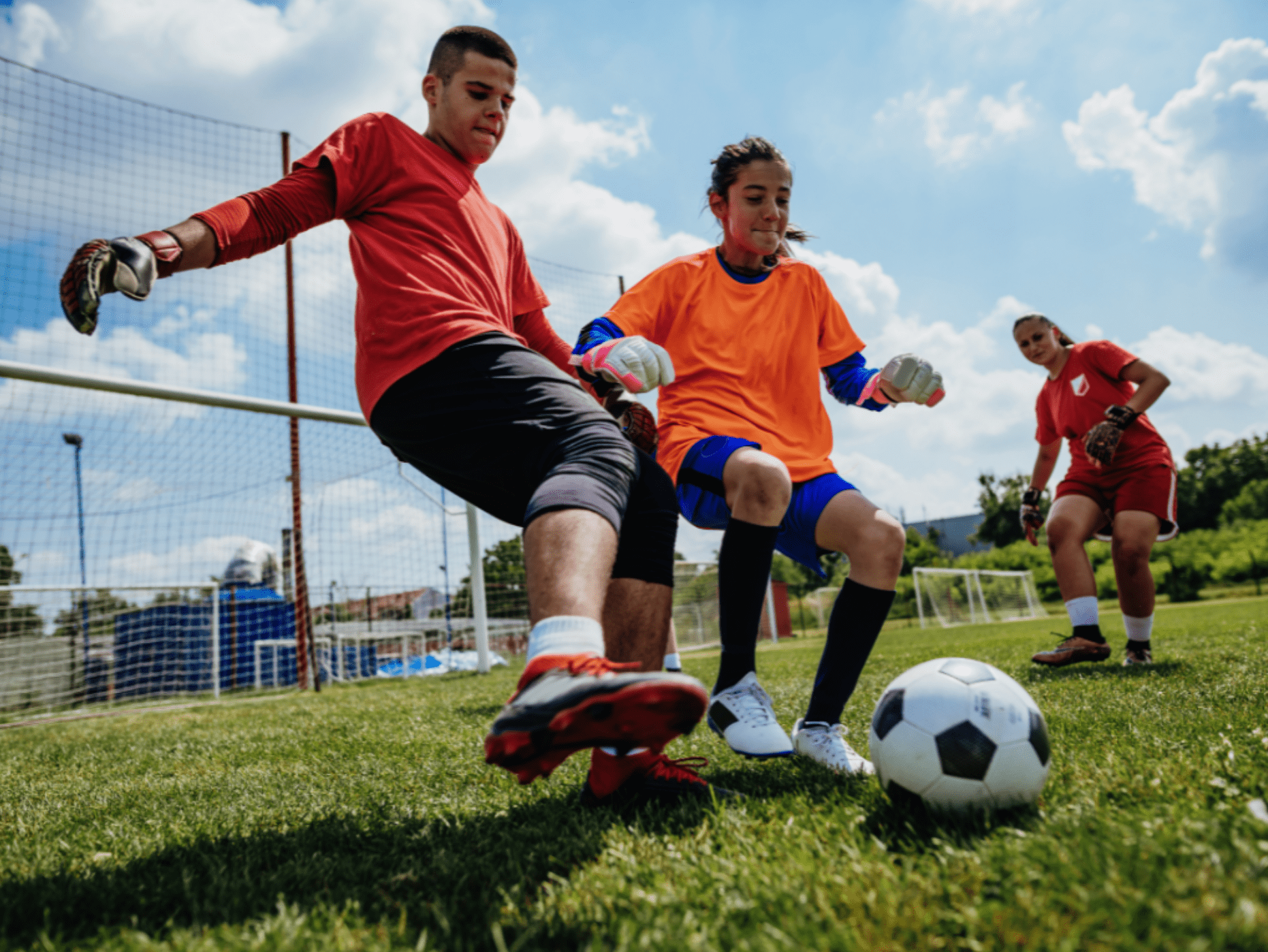To get the most out of sports and fitness activities, bodies require fuel, and the foundation of a balanced, healthy diet is the ideal place to start. There aren't any easy solutions. In particular, teens shouldn't use supplements.

Athletes and sports participants need to consume a healthy diet in addition to physical preparation. Understanding the significance of a well-balanced diet, sufficient hydration, and suitable supplements may have a big impact on an active teen's performance and general health.
Adolescents and teenagers have special dietary needs. What do you get when you combine the two? A young person who requires a higher-calorie diet and the proper nutritional balance to promote athletic performance. This article will provide nutrition advice for active teens involved in sports and also discuss the importance of hydration and balanced meals.
Pre and During Sports Nutrition: Fuels for Sports
Eating the proper nutrients in sufficient quantities can enhance performance. A well-balanced diet contains a variety of carbs, proteins, and fats that are required for energy, muscle repair, and general body processes.
The major source of energy is carbohydrates, which may be found in meals such as whole grains, fruits, and vegetables. Proteins from lean meats, dairy, beans, and nuts aid in muscle repair and growth. Healthy fats, such as those found in avocados, almonds, and olive oil, help cells operate and give prolonged energy.
A Sports Nutrition Guide ($90) is a great tool for preparing these meals since it provides specialized guidance on meal planning, snack ideas, and recipes that help maintain energy levels and promote recovery.
Importance of Cabohydrate and for Energy
Carbohydrate and fat are the primary fuel sources for muscular activity. Participating in high-intensity sports requires consuming more carbohydrates. Carbohydrates should make up more than half of your daily calorie intake, so incorporate them into all meals and snacks.
Because the body can only retain a certain number of carbohydrates, it's important to replenish them regularly. Carbohydrates are the principal energy source for athletes. Consuming complex carbs such as whole grains, fruits, and vegetables before a sport offers the required fuel to power through strenuous activity.
Small doses of quickly digested carbohydrates, such as those found in sports beverages or energy gels, can help sustain energy levels over longer periods of time.
Importance of Fat to Stay Healthy
When considering fat, it's important to consider the appropriate kind and quantity because everybody needs a certain amount of fat to stay healthy. Good fats are present in diets, such as almonds, avocados, oily fish (including salmon, sardines, and mackerel), and vegetable oils.
Reduce the number of items like crisps, pastries, and fried meals that contain unhealthy fats.
If the fat in your diet is too low, it might be It's challenging to provide your body adequate energy for your sports activity. You may gain weight if your diet contains an excessive amount of fat.
A young athlete may consume up to one-third of their calories from fat. Dietary fats and carbohydrate options may be easily combined to generate straightforward fuel combinations.
The Role and Importance of Protein in Muscle Repair and Growth
Protein is essential for tissue and muscle repair, maintenance, and development in your body. Proteins are necessary for muscle repair and development. Pre-sports meals containing lean proteins such as chicken, fish, beans, and dairy help prepare the muscles for the pressure of physical exercise.
Protein promotes development and lowers the chance of damage from daily use of the same muscles during recurrent activity. For teenage girls and boys, the Recommended Daily Allowance (RDA) for protein is 46 grams and 52 grams, respectively. Teen athletes may, however, take in up to 1.5 grams of protein per kilogram of body weight each day. This equates to around 85 grams per day for an athlete weighing 125 pounds.
Most people obtain enough amounts of protein via a diversified, well-balanced diet.
It is not advised for young athletes to use protein smoothies or powders. It's untrue that consuming a lot of protein is necessary to "bulk up." If you include the items listed below in your diet, you will receive plenty of protein.
Long-term exercise sessions benefit from electrolyte beverages because they help restore lost minerals like potassium and salt, which are essential for muscular function.
Hydration Tips for Optimal Performance
Most children don't consume enough liquids during the day. Our young athletes are particularly vulnerable to dehydration when you factor in the fluid loss that occurs with physical exertion. It's crucial to stay hydrated before, during, and after physical activity. Waiting until you feel thirsty is not a good idea, since it indicates that your body has been dehydrated for some time.
If you plan to compete or train for more than 60 minutes, you might want to consider replacing lost fluids with an isotonic sports drink.
Maintaining performance levels requires drinking enough water. By ensuring that the body is well hydrated before exercising, you can lower your risk of cramping and dehydration.
To ensure that your body is well hydrated (that is, that it has all the fluids it needs) before you begin exercising, drink a lot of water throughout the day. How about carrying a water bottle throughout the classroom to ensure that you are constantly replenishing your hydration intake?
One easy and quick way to determine if you are getting enough fluids in your diet is to look at the color of your urine. It ought to be a light yellow in hue. If it's any darker than this, you should consume more alcohol. Some facts you should know about staying hydrated;
- The optimum fluid to use is water
- Low-fat milk works well in place of lost fluids
- While isotonic sports drinks can be beneficial during and after extended, intensive periods of exercise, you shouldn't consume them constantly.
Drinking water often while exercising is essential to replenishing fluids lost via perspiration. Dehydration can impair performance and raise the chance of being hurt.
Electrolyte beverages can help maintain hydration balance and replace lost minerals during prolonged activity, particularly in hot conditions. Adopting an Electrolyte Drink Mix ($85) can help teens perform at their best by preventing muscular cramps and dehydration.

Post-Sports recovery
To support muscle repair and restore glycogen reserves, it's critical to refuel with a mix of carbs and protein after exercise. One affordable alternative is a protein smoothie made with Protein Powder ($100).
Lean meats, fish, eggs, and leafy greens are nutrient-dense foods that supply the vitamins and minerals needed for muscle regeneration and general healing when they are included in post-sports meals.
It's critical to rehydrate following exercise. Consuming electrolyte-rich meals and beverages, together with water, aids in the body's hydration equilibrium restoration and promotes healing.
Role of Supplements in a Balanced-Diet
Sports supplements are available in a variety of forms, including beverages, protein bars and powders, liquid meal replacements, herbal remedies, caffeine, and creatine. Are they needed? No. They won't improve your strength, speed, or skill.
While supplements have a place in an athlete's diet, they shouldn't take the place of complete meals. When taken as directed, essential supplements such as electrolyte mixes and protein powder can help meet nutritional demands.
Before taking any supplements, though, it's crucial to speak with a healthcare professional to be sure they're secure and appropriate for your requirements.
Advice for Teens Actively Involved in Sports
- Never miss a meal, particularly in the morning.
- Drink a lot of water.
- Steer clear of high-fat snacks and lunches, including fried foods, chips, and crisps, two to three hours before a workout. These take longer to digest, and when you exercise, you can feel ill.
- Consume healthy protein sources each day.
- Consume a lot of meals high in carbohydrates throughout the day.
- Remember that fats are essential; select foods that are higher in fat.
- Consume five servings or more of fruit and vegetables every day.
- Add enough amounts of calcium and iron; teenagers require higher doses of these minerals than people of other ages.
- Enjoy your meals and snacks as much as possible.
- You will feel more hungry after a strenuous workout; pay attention to these hunger cues.
- Get adequate sleep and relax to allow your body to develop and heal.
Conclusion
For the purpose of maintaining physical growth and supporting athletic performance, young athletes need about 3000 calories, sometimes even more. The majority of teenagers and adolescents have irregular eating and snacking schedules and few opportunities to eat during the day.
Some people find it hard to have breakfast early or finish lunch in the allocated amount of time. When the school-age athlete has a lengthy afternoon and a late meal, this gets much more difficult. Youth athletes therefore require a well-balanced combination of nutrient-dense meals that complement each other to provide an acceptable intake.
To perform at their peak, athletes must consume the right foods. Young athletes may maximize their performance and recuperation by knowing and putting into practice the proper ratios of carbs, proteins, and fats, as well as by drinking plenty of water.
To support your nutritional needs, don't forget to refer to resources like the Sports Nutrition Guide ($90) and think about including items like Protein Powder ($100) and Electrolyte Drink Mix ($85). Make healthy eating a priority, drink enough water, and fuel your body to excel in sports and athletics.
Sources
Fuel Your Body Guide (INDI):
Guiding Stars: Fueling Your Youth Athlete: